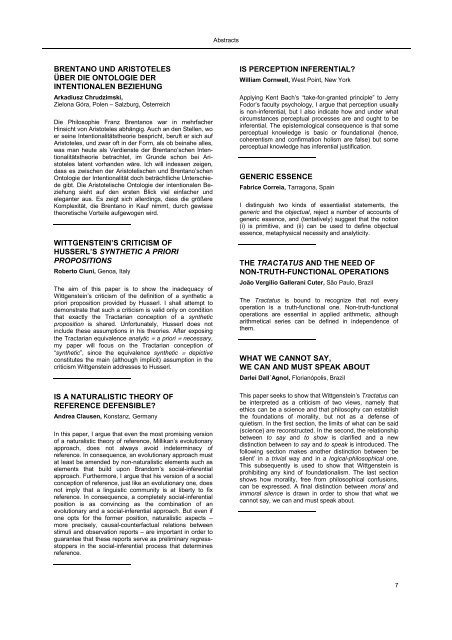Erfahrung und Analyse Experience and Analysis - Austrian Ludwig ...
Erfahrung und Analyse Experience and Analysis - Austrian Ludwig ...
Erfahrung und Analyse Experience and Analysis - Austrian Ludwig ...
You also want an ePaper? Increase the reach of your titles
YUMPU automatically turns print PDFs into web optimized ePapers that Google loves.
BRENTANO UND ARISTOTELES<br />
ÜBER DIE ONTOLOGIE DER<br />
INTENTIONALEN BEZIEHUNG<br />
Arkadiusz Chrudzimski,<br />
Zielona Góra, Polen – Salzburg, Österreich<br />
Die Philosophie Franz Brentanos war in mehrfacher<br />
Hinsicht von Aristoteles abhängig. Auch an den Stellen, wo<br />
er seine Intentionalitätstheorie bespricht, beruft er sich auf<br />
Aristoteles, <strong>und</strong> zwar oft in der Form, als ob beinahe alles,<br />
was man heute als Verdienste der Brentano’schen Intentionalitätstheorie<br />
betrachtet, im Gr<strong>und</strong>e schon bei Aristoteles<br />
latent vorh<strong>and</strong>en wäre. Ich will indessen zeigen,<br />
dass es zwischen der Aristotelischen <strong>und</strong> Brentano’schen<br />
Ontologie der Intentionalität doch beträchtliche Unterschiede<br />
gibt. Die Aristotelische Ontologie der intentionalen Beziehung<br />
sieht auf den ersten Blick viel einfacher <strong>und</strong><br />
eleganter aus. Es zeigt sich allerdings, dass die größere<br />
Komplexität, die Brentano in Kauf nimmt, durch gewisse<br />
theoretische Vorteile aufgewogen wird.<br />
WITTGENSTEIN’S CRITICISM OF<br />
HUSSERL’S SYNTHETIC A PRIORI<br />
PROPOSITIONS<br />
Roberto Ciuni, Genoa, Italy<br />
The aim of this paper is to show the inadequacy of<br />
Wittgenstein’s criticism of the definition of a synthetic a<br />
priori proposition provided by Husserl. I shall attempt to<br />
demonstrate that such a criticism is valid only on condition<br />
that exactly the Tractarian conception of a synthetic<br />
proposition is shared. Unfortunately, Husserl does not<br />
include these assumptions in his theories. After exposing<br />
the Tractarian equivalence analytic a priori necessary,<br />
my paper will focus on the Tractarian conception of<br />
“synthetic”, since the equivalence synthetic depictive<br />
constitutes the main (although implicit) assumption in the<br />
criticism Wittgenstein addresses to Husserl.<br />
IS A NATURALISTIC THEORY OF<br />
REFERENCE DEFENSIBLE?<br />
Andrea Clausen, Konstanz, Germany<br />
In this paper, I argue that even the most promising version<br />
of a naturalistic theory of reference, Millikan’s evolutionary<br />
approach, does not always avoid indeterminacy of<br />
reference. In consequence, an evolutionary approach must<br />
at least be amended by non-naturalistic elements such as<br />
elements that build upon Br<strong>and</strong>om’s social-inferential<br />
approach. Furthermore, I argue that his version of a social<br />
conception of reference, just like an evolutionary one, does<br />
not imply that a linguistic community is at liberty to fix<br />
reference. In consequence, a completely social-inferential<br />
position is as convincing as the combination of an<br />
evolutionary <strong>and</strong> a social-inferential approach. But even if<br />
one opts for the former position, naturalistic aspects –<br />
more precisely, causal-counterfactual relations between<br />
stimuli <strong>and</strong> observation reports – are important in order to<br />
guarantee that these reports serve as preliminary regressstoppers<br />
in the social-inferential process that determines<br />
reference.<br />
Abstracts<br />
IS PERCEPTION INFERENTIAL?<br />
William Cornwell, West Point, New York<br />
Applying Kent Bach’s “take-for-granted principle” to Jerry<br />
Fodor’s faculty psychology, I argue that perception usually<br />
is non-inferential, but I also indicate how <strong>and</strong> <strong>und</strong>er what<br />
circumstances perceptual processes are <strong>and</strong> ought to be<br />
inferential. The epistemological consequence is that some<br />
perceptual knowledge is basic or fo<strong>und</strong>ational (hence,<br />
coherentism <strong>and</strong> confirmation holism are false) but some<br />
perceptual knowledge has inferential justification.<br />
GENERIC ESSENCE<br />
Fabrice Correia, Tarragona, Spain<br />
I distinguish two kinds of essentialist statements, the<br />
generic <strong>and</strong> the objectual, reject a number of accounts of<br />
generic essence, <strong>and</strong> (tentatively) suggest that the notion<br />
(i) is primitive, <strong>and</strong> (ii) can be used to define objectual<br />
essence, metaphysical necessity <strong>and</strong> analyticity.<br />
THE TRACTATUS AND THE NEED OF<br />
NON-TRUTH-FUNCTIONAL OPERATIONS<br />
João Vergílio Gallerani Cuter, São Paulo, Brazil<br />
The Tractatus is bo<strong>und</strong> to recognize that not every<br />
operation is a truth-functional one. Non-truth-functional<br />
operations are essential in applied arithmetic, although<br />
arithmetical series can be defined in independence of<br />
them.<br />
WHAT WE CANNOT SAY,<br />
WE CAN AND MUST SPEAK ABOUT<br />
Darlei Dall´Agnol, Florianópolis, Brazil<br />
This paper seeks to show that Wittgenstein’s Tractatus can<br />
be interpreted as a criticism of two views, namely that<br />
ethics can be a science <strong>and</strong> that philosophy can establish<br />
the fo<strong>und</strong>ations of morality, but not as a defense of<br />
quietism. In the first section, the limits of what can be said<br />
(science) are reconstructed. In the second, the relationship<br />
between to say <strong>and</strong> to show is clarified <strong>and</strong> a new<br />
distinction between to say <strong>and</strong> to speak is introduced. The<br />
following section makes another distinction between ‘be<br />
silent’ in a trivial way <strong>and</strong> in a logical-philosophical one.<br />
This subsequently is used to show that Wittgenstein is<br />
prohibiting any kind of fo<strong>und</strong>ationalism. The last section<br />
shows how morality, free from philosophical confusions,<br />
can be expressed. A final distinction between moral <strong>and</strong><br />
immoral silence is drawn in order to show that what we<br />
cannot say, we can <strong>and</strong> must speak about.<br />
7












